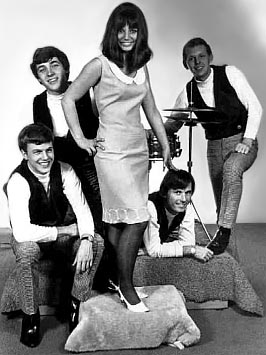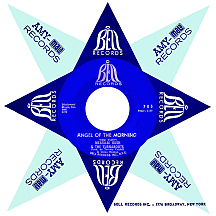MERRILEE RUSH
AND THE TURNABOUTS
Angel of the Morning
Dozens of female singers emerged in the Seattle area during the late 1950s and early '60s, most of them a little tougher than your typical teen thrush, yet only a few gained success on a national level. Bonnie Guitar, the "Dark Moon" singer whose style touched on pop, country and rock and roll, was one. Gretchen Christopher and Barbara Ellis hit the million-seller tier as two-thirds of The Fleetwoods, whose early records just happened to be produced by Bonnie. One other who started around that time was Merrilee Ann Gunst of Seattle's north end, in 1960 a 16-year-old studying classical piano, entertaining servicemen at USO shows though seldom taking the microphone. Once she did flex her vocal cords, a series of events resulted in a hit record...and it only took eight years!
Neil Rush blew sax for The Amazing Aztecs, a band from Renton, some 20 miles southeast of Seattle. In 1960, Merrilee reluctantly auditioned against two more seasoned singers but Neil, drawn by her subtle beauty, gave her the gig (and married her three years later). The group broke up after a time, then the lovebirds formed Merrilee and her Men, taking advantage of the obvious benefit of having a female lead, rare for rock and roll groups in those days. Having a preference for rhythm and blues, by 1962 she was playing a Hammond organ with Tiny Tony and the Statics, led by black singer Anthony Smith. "Hey Mrs. Jones" (a remake of a ten-year-old Jimmy Forrest hit) came out on the Seafair Bolo label with dual vocals by Tony and a feisty Merrilee, plus some blistering sax work by Neil, and received a fair amount of exposure on Seattle-area stations that summer. Another single, credited to The Statics and Tiny Tony, appeared late in 1963; one listen to "Harlem Shuffle," a cover of the hit by Bob and Earl, proves she was wrong about one thing: Merrilee has insisted she "wasn't that good" in those days, yet in reality her smoky vocal sound (a contrast to her sweet-and-innocent looks) set her apart from most female vocalists, particulary the white suburban ones. This girl had the goods!
Singles by the Statics without Tiny Tony were recorded for Bolo sub-label Bregg ("Buster Brown," an instrumental) and Camelot Records of Lynnwood, closer to Merrilee's North Seattle stomping grounds. Her vocals and the arrangement on "Tell Me the Truth" had a much more rocking vibe, a direction she was to explore further in the British-influenced music environment of post-'64. Merrilee and the Turnabouts, a five-member outfit with Neil, guitarist Vern Kjellberg, bassist Terry Gregg and drummer Ed Leckenby, was established the following year via "Too Bad (We Can't Get Along)" on another small Lynnwood-based label, Quest. The sound evolved a bit (for the better) with "It's Alright" on Ru-Ro (Neil's own label, also an outlet for a couple of other local bands). Two singles were issued on Merrilin Records (young entrepreneurs!) in 1966: "Lovers Never Say Goodbye," a faithful remake of The Flamingos' 1959 hit, and "How's the Weather on Your Street," a pop-rock tune unlike earlier efforts while consistent with the pop-to-psychedelic trend unfolding at the time. Live performing was the band's bread and butter and they were one of the more popular attractions on Seattle's rock scene during the mid-'60s.

1967 brought expansion beyond the Pacific Northwest when hitmaking Portland-based band Paul Revere and the Raiders embarked on a series of dates throughout the southern states and invited Merrilee's group to open for them. Wrapping the tour late in the year, the Raiders commenced to lay down tracks for their Goin' to Memphis album at the city's American Sound Studio. Merrilee stayed around awhile and ended up doing a session of her own in January '68 with the studio's regular musicians. "Angel of the Morning," written by Chip Taylor ("Wild Thing" by The Troggs was his main claim-to-fame), had lyrics suggesting a sexual one-night-stand ('I see no reason to take me home, I'm old enough to face the dawn...') that were a bit bold even by the standards of early '67, when Evie Sands made the original recording of the song for Cameo Records. Producers Tommy Cogbill and "Chips" Moman gave it a whirl with Merrilee; it was released on Bell Records as Merrilee Rush and the Turnabouts (adding her last name gives it more of a "rock" vibe, doncha think?), though none of the Turnabouts were actually present in the studio.
She went back home and resumed working the Seattle club circuit. Within a week or two, local stations started spinning the record; in May it broke nationally, becoming a top ten summertime smash. Rush and her Turnabouts were in high demand for concerts and TV appearances over the next year or so; a follow-up, "That Kind of Woman" (a first for songwriter Mary Unobsky and "Bette Davis Eyes" composer Donna Weiss), was most popular in Southern California, a minimal blip on the Seattle radar...not a good sign! An early '69 Grammy nomination for "Angel" in the category Best Contemporary Pop Vocal Performance, Female (ignoring the group designation...oh, those wacky Grammys!) put her in contention with another breakout act, Welsh singer Mary Hopkin, and a trio of U.S. stars named Aretha, Barbra and winner Dionne.
Merrilee was placed on AGP Records (Bell's imprint for Moman's Memphis-based American Sound) and the Turnabouts were out; a psychedelic, Vanilla Fudge-style reconfiguration of the Four Tops' "Reach Out I'll Be There" (as "Reach Out") was her third chart single, then three Billboard "Bubbling Under" entries took her through the end of '69 (all of a sudden, with songs like "Everyday Livin' Days" and "Sign on for the Good Times," she had shifted into pop-country mode). In the summer of 1971 she had a one-off single for Scepter, a touching Gerry Goffin-Carole King ballad, "Child of Mine." Performing live became a steady habit and she enjoyed a brief comeback in 1977 after signing a solo contract with United Artists. The breezy, radio-friendly "Save Me" was well-received by critics and had a mid-chart run; she's been performing for audiences on a part-time basis ever since. In 1984, Merrilee Rush sang "White Christmas" on a syndicated television special, Scrooge's Rock and Roll Christmas, which featured a who's-who of late-'60s stars: Bobby Goldsboro, Dean Torrence of Jan and Dean, Beach Boy Mike Love, The Association, Three Dog Night and even her old tourmates The Raiders.


